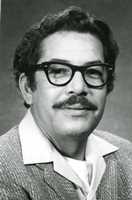Biochemistry, Physiology
1929-2010
Dr. Atencio, obtained a doctorate in biochemistry at University of Colorado, Boulder, and completed postdoctoral work at Northwestern University. He joined the SOM Department of Biochemistry in 1970. Though his research interest was in the role of factor XIII in fibrinogen synthesis, Dr. Atencio’s true passion was medical education. He soon was appointed Assistant Dean for Student Affairs and Director of Minority Programs. In 1971, Atencio was awarded a grant from the Macy Foundation to recruit high school students to medical school. He spoke to every high school principal in the state, and got lists of students who were potential college students. He focused not just on medical school recruitment, but college recruitment. After helping the students get scholarships to go to college, he continued to mentor them to apply to medical school. He established motivational workshops designed to interest college freshmen toward careers in medicine. His efforts to increase the number of native New Mexicans applying to medical school, were relentless. With funding from the Hispanic Centers of Excellence in the U.S. Department of Health and Human Services, he initiated basic science courses prior to medical school, to prepare incoming minority medical students. In addition to recruitment efforts, Dr. Atencio initiated review courses for the National Board examination, as well as the Medical College Admissions Test (MCAT). In his tenure at UNM-SOM, he created a national model for retention of students. He ultimately became known as the "Godfather of minority medical education."


I first met Alonzo "Al" Atencio in the late 1970s when I was a Minority Biological Sciences (MBS) student at UNM working with Dr. Donald Priola in the Physiology Department. After graduation I had the opportunity to work with Al for a year, and he became a great partner and leader for many initiatives that we undertook to advance minority students with significant potential to contribute in careers in medicine and other areas of the health sciences. Al was one of the earliest visionaries who recognized that across New Mexico and other states there was an untapped pool of talent that would not able to advance through what were in those times barriers for minority students. He took on the political aspects, as well as the educational agenda to identify the funds to support these efforts but was also a passionate and involved facilitator and leader of numerous programs that had a lifelong impact on students and on the profession as a whole. For me, he became an inspiration, and his spirit helped drive my journey that has included several degrees, including a doctoral degree from Harvard University.